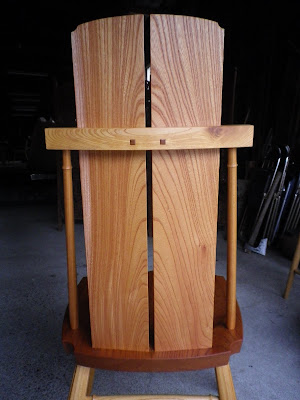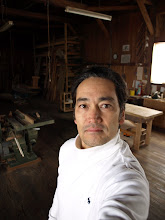These are some of the latest pieces,
mostly done in the last 3 months.
Also made 49 of my Christmas "Woodtrees".
The leg system for the Ogawa dining table is
made from an old Japanese rice-pounding mortar.
It was cut in half and used at each end of the table,
with a connecting shelf in between.
Thursday, December 16, 2010
Wednesday, September 22, 2010
Tuesday, July 20, 2010
Tuesday, May 25, 2010
Nagoya Exhibit Report
I'm back from urbanity, the walking, talking, showing, hustle and bustle. It was great to meet many woodworkers and some new visitors. Had some great talks on wood and work and design, and future endeavors. My work seemed to be different from most in that it emphasized the natural medium itself, and larger single board pieces. The technical skill level of others was very high, and their work tended to show this, as well as their more urban and modern design interests. We sold no pieces, but I did receive one order. The best news for me was that in the "100 Chairs" exhibit, my Hina Chair was chosen no.4, by visitor selection; with great comments on use of wood, original design, and "feeling" verging on philosophy. When I arrived back in Joetsu I felt the need to cleanse myself of the city, and so spent two days alone in the forest - with my trusty axe! Picked up that old habit in Michigan, in my early teens. Best regards, Russell
Wednesday, April 28, 2010
Nagoya Woodworker's Exhibit, May 11th - 16th.
Hello friends and readers, I don't get to the blog much, but I hope you check out the photos. I will update those too when I get new projects done that are worth
showing. I appreciate your observations.
I am now prepping for my first furniture exhibit outside of Niigata prefeture. I am participating in a national woodworker's exhibit, in Nagoya, May 11th - 16th. There are 11 different exhibits scattered within the city, each with its own theme. I am scheduled to show in the "Mori no Megumi" (blessings of the forest) exhibit, and the "100 Chairs" exhibit. Mori no Megumi is a 'show only,' 'no-sales' exhibit, and therefore I have decided to honor the theme, to have some fun with it, and not concentrate on saleable works only. I am working particularily on a chair and a lamp stand made of zelkova (elm) branches, also a low round table with a suspended light. I will enter photos of those on the blog once the show is under way - or afterward, knowing me!
Don't hesitate to visit me in Nagoya during the show! http://woodworkers.jp/
I appreciate you viewing my work. Please contact me. e-mail: r.jokela@gmail.com
showing. I appreciate your observations.
I am now prepping for my first furniture exhibit outside of Niigata prefeture. I am participating in a national woodworker's exhibit, in Nagoya, May 11th - 16th. There are 11 different exhibits scattered within the city, each with its own theme. I am scheduled to show in the "Mori no Megumi" (blessings of the forest) exhibit, and the "100 Chairs" exhibit. Mori no Megumi is a 'show only,' 'no-sales' exhibit, and therefore I have decided to honor the theme, to have some fun with it, and not concentrate on saleable works only. I am working particularily on a chair and a lamp stand made of zelkova (elm) branches, also a low round table with a suspended light. I will enter photos of those on the blog once the show is under way - or afterward, knowing me!
Don't hesitate to visit me in Nagoya during the show! http://woodworkers.jp/
I appreciate you viewing my work. Please contact me. e-mail: r.jokela@gmail.com
Thursday, April 1, 2010
National Woodworker's exhibit in Nagoya
Participating in a national woodworker's exhibit in Nagoya,
May 11th to 16th.
One exhibit is for general furniture, with the theme called
"Mori no Megumi." The second exhibit is "100 Chairs."
This is my first exhibit outside of Niigata prefecture.
Please see the website for more infomation.
http://woodworkers.jp/
And please Visit!!
May 11th to 16th.
One exhibit is for general furniture, with the theme called
"Mori no Megumi." The second exhibit is "100 Chairs."
This is my first exhibit outside of Niigata prefecture.
Please see the website for more infomation.
http://woodworkers.jp/
And please Visit!!
Sunday, March 21, 2010
The Custom of 'custom' furniture.
Designing and making 'custom furniture' can be like playing music by ear, a spontaneous creative act; every new order is a harmonized balance of client needs, location, function, dimensions, budget, time, suitable wood and its proper use, color, grain, construction techniques, available tools, etc.
All of these and more are weighed, implemented, and brought to a finished whole; and if successful, attain a balance that pleases the client.
Like other art forms, this is a combination of personal, pre-existing style, and the inspiration in immediate circumstance.
What is more uncommon in much custom design work however,is being truly 'custom.' The overall tendancy is to pre-determined or personal expression, and not so to allowing or orchestrating the expressions of environment, of medium, of others, of nature, of the moment.
A great potential exists, not in accustomed and self-willed expression, or personal projection, but in being a kind of conduit which perceives the inherent value of all involved factors, and choreographs their blended and original composition.
The ability to do this comes from the successive use of our vital six senses (including the mind;) which are all really "listening" senses, for perceiving outer information - not senses of projection. A long and sensitive life in nature required refined senses, for listening.
Much furniture of the world is apparently designed with priority to form, dervative of individual expression, or mental ideas, and not often from pragmatic, natural, or medium-oriented inspirations - the latter of which usually retain a greater timeless quality.
While learning how to "read" and use wood, (and not only how to work it,)from Japanese shokunin, or professional craftsmen, I became aware of a 'selfless' way of thinking, designing, and composing work which emphasizes the many other qualities involved; along with your own preferences or accumulated style. This may also have much to do with Japanese customs and tradition, but not entirely I think.
My hope is that these 'other' qualities, and a natural feeling can be felt in the furniture pieces that I am entrusted to create. I am as pleased to put my work in the care of the client as I was in making them. The greatest satisfaction in this work comes from having the real value in a piece of wood find realization, without waste, and then be appreciated for its own qualities.
Please feel free to contact me. Russell Jokela
All of these and more are weighed, implemented, and brought to a finished whole; and if successful, attain a balance that pleases the client.
Like other art forms, this is a combination of personal, pre-existing style, and the inspiration in immediate circumstance.
What is more uncommon in much custom design work however,is being truly 'custom.' The overall tendancy is to pre-determined or personal expression, and not so to allowing or orchestrating the expressions of environment, of medium, of others, of nature, of the moment.
A great potential exists, not in accustomed and self-willed expression, or personal projection, but in being a kind of conduit which perceives the inherent value of all involved factors, and choreographs their blended and original composition.
The ability to do this comes from the successive use of our vital six senses (including the mind;) which are all really "listening" senses, for perceiving outer information - not senses of projection. A long and sensitive life in nature required refined senses, for listening.
Much furniture of the world is apparently designed with priority to form, dervative of individual expression, or mental ideas, and not often from pragmatic, natural, or medium-oriented inspirations - the latter of which usually retain a greater timeless quality.
While learning how to "read" and use wood, (and not only how to work it,)from Japanese shokunin, or professional craftsmen, I became aware of a 'selfless' way of thinking, designing, and composing work which emphasizes the many other qualities involved; along with your own preferences or accumulated style. This may also have much to do with Japanese customs and tradition, but not entirely I think.
My hope is that these 'other' qualities, and a natural feeling can be felt in the furniture pieces that I am entrusted to create. I am as pleased to put my work in the care of the client as I was in making them. The greatest satisfaction in this work comes from having the real value in a piece of wood find realization, without waste, and then be appreciated for its own qualities.
Please feel free to contact me. Russell Jokela
Wednesday, February 24, 2010
Friday, February 12, 2010
Tuesday, February 2, 2010
WOODESIGN Works

Preserving `Character of nature! in work has many benifits
-especially important today.
1. Brings feeling of nature into everyday life.
2. Increase apporeciation for natureal mediums.
3. Opportunity to communicate with.
4. Develops ability to `read` and use wood properly.
5. Enhances care for quality this way.
6. Supports creftsmen working this way.
These are some of the benefits of making, buying, and
using hand made porducts of natural materials.
A little more expensive and more care required,
however; there are more important benefits than using
mass-produced things.
Subscribe to:
Comments (Atom)







































